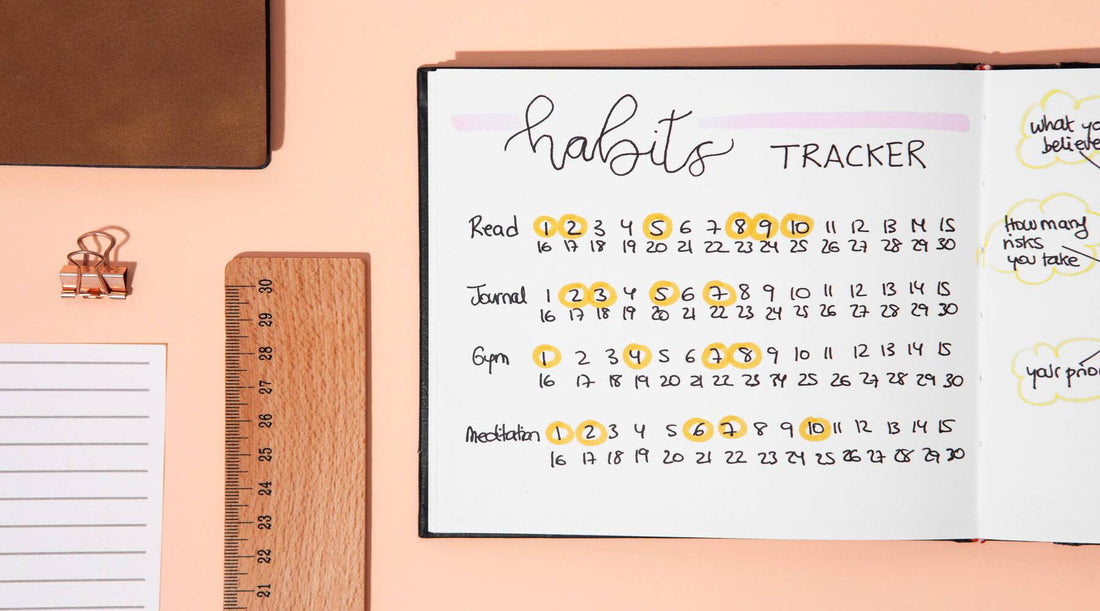How to Make a Habit Tracker That Works - Ultimate Guide

What Is a Habit Tracker?
A habit tracker is a powerful tool designed to help you monitor and manage your daily habits. Essentially, it's a way to visually represent your goals, whether they're related to fitness, productivity, or personal growth. By recording each time you complete a specific task, you create a pattern that shows your progress over time.
At its core, a habit tracker works by giving you a clear visual representation of how consistently you're meeting your goals. You might use symbols like checkmarks, dots, or even stickers to mark each completed task. Over time, this record reveals patterns in your behavior, making it easier to identify what's working and what needs adjustment.

Habit tracking isn't just about keeping tabs on your actions; it's also about building awareness. By regularly reviewing your tracker, you gain deeper insights into your habits and can make more informed decisions about your lifestyle.
In short, a habit tracker serves as both a mirror and a map: it reflects your current behaviors and guides you toward your future goals.
Benefits of Using Habit Trackers
Using a habit tracker can be transformative. It’s not just a tool for productivity; it's a means to improve various aspects of your life, from self-awareness to time management. Let's explore some of these incredible benefits.
1. Habit trackers help you improveself-awareness
Understanding yourself is the first step to making meaningful changes in your life. Using a habit tracker allows you to see your actions and behaviors clearly, helping you become more self-aware. When you know what you're doing right and where you're falling short, you can make adjustments to better align with your goals.
By keeping a record, you can pinpoint the times of day when you're most productive or notice patterns that affect your behaviors. This kind of insight is invaluable because it helps you understand the triggers and rewards associated with your habits.
2. Habit tracking encourages personal growth
Personal growth isn't just about achieving big milestones; it's also about making consistent, incremental progress. A habit tracker helps you break down larger goals into manageable tasks, making them less daunting. Each small step forward contributes to your overall growth and development.
Tracking your habits encourages you to reflect on your journey. Regularly reviewing your progress helps you celebrate your successes and learn from your setbacks, fostering an ongoing cycle of self-improvement.
3. Habit trackers help you manage time more effectively
Time management is crucial for achieving your goals, and a habit tracker can be a game-changer in this area. By outlining your daily, weekly, or monthly tasks, you can prioritize what's important and allocate your time accordingly.
With a clear plan in place, you're less likely to waste time on unproductive activities. Instead, you'll focus on completing the tasks that move you closer to your goals, making your days more efficient and fulfilling.
4. Habit tracking improves focusand motivation
Staying focused and motivated can be challenging, but a habit tracker can provide the boost you need. Seeing your progress laid out visually can be incredibly motivating, especially when you start to notice trends and streaks.
When you mark off a completed task, it gives you a sense of accomplishment. This positive reinforcement encourages you to keep going, even when the initial excitement of starting a new habit wears off.

A habit tracker also helps you build momentum. As you see your streaks grow, you'll naturally want to maintain them, which keeps you focused on your goals. The act of tracking itself becomes a motivator, driving you to stay committed.
Plus, having a habit tracker means you can set reminders and deadlines, adding another layer of accountability. Knowing you need to mark something off can push you to complete tasks you might otherwise postpone.
4 Habit Tracking Methods
There are several ways to track your habits, each with its own pros and cons. Whether you prefer physical tools or digital solutions, there's a method that will suit your needs. Let's delve into some popular options.
1. Printed template
A printed habit tracking template is a straightforward and effective way to keep track of your habits. These templates typically feature grids or charts where you can mark off each completed task. They're easy to customize, allowing you to tailor them to your specific goals.
Pros
A printed template provides a tactile experience that many people find satisfying. You get the pleasure of physically marking off each task, which can be a powerful motivator. Plus, having a tangible record of your progress can be incredibly rewarding.
One major advantage of printed templates is their flexibility. You can design them to fit any timeframe, whether that's daily, weekly, or monthly. You can also incorporate different colors and symbols to make them visually appealing and easier to read.
Cons
Printed templates can be less convenient to carry around compared to digital options. You may also need to print new templates regularly, which requires access to a printer.
Despite these drawbacks, many people find printed templates to be highly effective. If you decide to try this method, consider investing in a portable printer. A portable printer is lightweight and easy to use, allowing you to print your habit tracker anytime, anywhere. It's perfect for creating customized to-do list, templates, and notes on the go.
2. Use Excel or Google Sheet to track your habit
For those who prefer digital solutions, Excel or Google Sheets offer robust options for habit tracking. These spreadsheet programs allow you to create detailed, customizable habit trackers that can be easily updated and analyzed. They're ideal for people who enjoy working with data.
Pros
Using Excel or Google Sheets, you can set up grids, charts, and graphs to visualize your progress. You can also use formulas to automate calculations, making it easy to track completion rates and identify trends. Plus, these programs offer a range of formatting options to make your tracker visually appealing.
One of the biggest advantages of using spreadsheets is their accessibility. You can access your habit tracker from any device with an internet connection, allowing you to update it on the go. This makes it a convenient option for busy individuals who need a flexible solution.
Cons
Setting up a spreadsheet can be time-consuming, especially if you're not familiar with the software. It also lacks the tactile satisfaction of marking off tasks with a pen or pencil.
3. Consider bullet journal
Bullet journaling is a popular method that combines habit tracking with creative expression. In a bullet journal, you create custom layouts to track your habits, along with other elements like to-do lists, calendars, and reflections. This method offers endless possibilities for personalization.

Pros
A bullet journal allows you to design your habit tracker to fit your unique needs and preferences. You can incorporate different colors, symbols, and layouts to make it visually appealing and easy to use. Plus, the act of creating your spreads can be a fun and relaxing activity.
One of the major advantages of bullet journaling is its versatility. You can use it to track multiple aspects of your life, from daily habits to long-term goals. This makes it a comprehensive tool for personal development and organization.
Cons
Setting up a bullet journal can be time-consuming, especially if you enjoy adding decorative elements. It also requires a certain level of commitment and consistency to maintain.
4. Using habit tracking Apps
For those who prefer digital convenience, habit tracking apps offer a modern solution. These apps are designed specifically for tracking habits, providing features like reminders, progress charts, and motivational quotes. They're perfect for people who want a user-friendly, on-the-go solution.
Pros
Habit tracking apps often come with pre-designed templates, making it easy to get started. You can set up daily, weekly, or monthly tasks and receive notifications to remind you to complete them. Some apps even offer social features, allowing you to share your progress with friends.
One of the biggest advantages of using apps is their accessibility. You can update your habit tracker from your smartphone or tablet, making it easy to stay on top of your goals no matter where you are. Many apps also offer data analysis features, helping you identify trends and patterns.
Cons
Habit tracking apps require a digital device and an internet connection, which may not always be available. Additionally, the reliance on technology can be a drawback for those who prefer a more tactile experience.
Some Frequently Asked Questions
1. How to start using a habit tracker?To start using a habit tracker, first choose a few specific and achievable habits you want to focus on. Decide whether you'll use a digital app, a printable template, or a bullet journal for tracking. Set clear and attainable goals for each habit, start small with just 2-3 habits, and commit to updating your tracker daily. Setting reminders can help ensure consistency.
2. Should i track habits daily, weekly, or monthly?The frequency of tracking depends on the habit itself. Daily tracking is ideal for habits that require consistent daily effort, like drinking water or exercising. Weekly tracking works well for habits that need attention multiple times a week, such as meal prepping. Monthly tracking is best suited for long-term goals that don’t need daily focus, like reviewing your budget or decluttering.
3. How do Istay motivated to keep using my habit tracker?Staying motivated involves creating visual progress, such as checking off completed days, which can be very satisfying. Set rewards for hitting milestones, share your goals with friends for accountability, and regularly review your progress to remind yourself why you started. Adjust your goals if necessary to make them more manageable and keep reflecting on your achievements.
4. What should Ido if i miss a day or two?Missing a day or two is normal and doesn't signify failure. Analyze why you missed those days—whether due to unforeseen circumstances or lack of motivation—and adjust your habit if needed. Resume tracking as soon as possible, focusing on the overall consistency rather than perfection.
5. How long does it take to form a new habit?Forming a new habit generally takes between 21 to 66 days, although this can vary depending on the complexity of the habit and individual differences. Patience is crucial; don't get discouraged if it takes longer. Focus on consistent effort over time, as gradual improvements are more sustainable than overnight success.
Summary
Incorporating a habit tracker into your daily routine can be a game-changer. Whether you opt for a printed template, notebook, spreadsheet, bullet journal, or digital app, the key is to find a method that works for you. By staying consistent and reflecting on your progress, you can achieve your goals and transform your life. So why wait? Start tracking your habits today and take the first step toward a better you.


